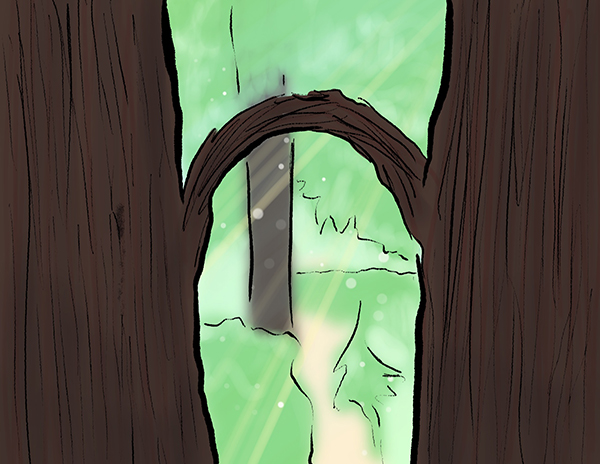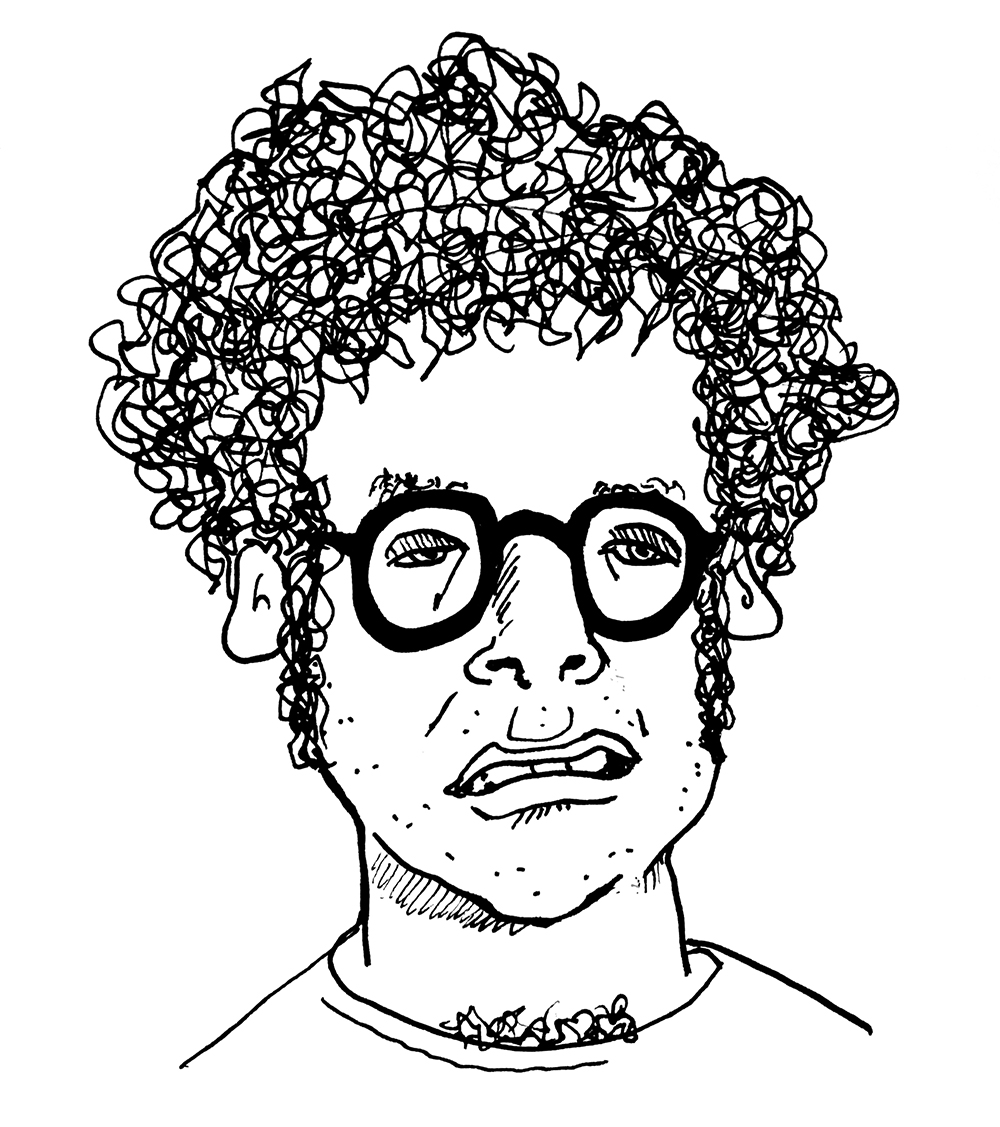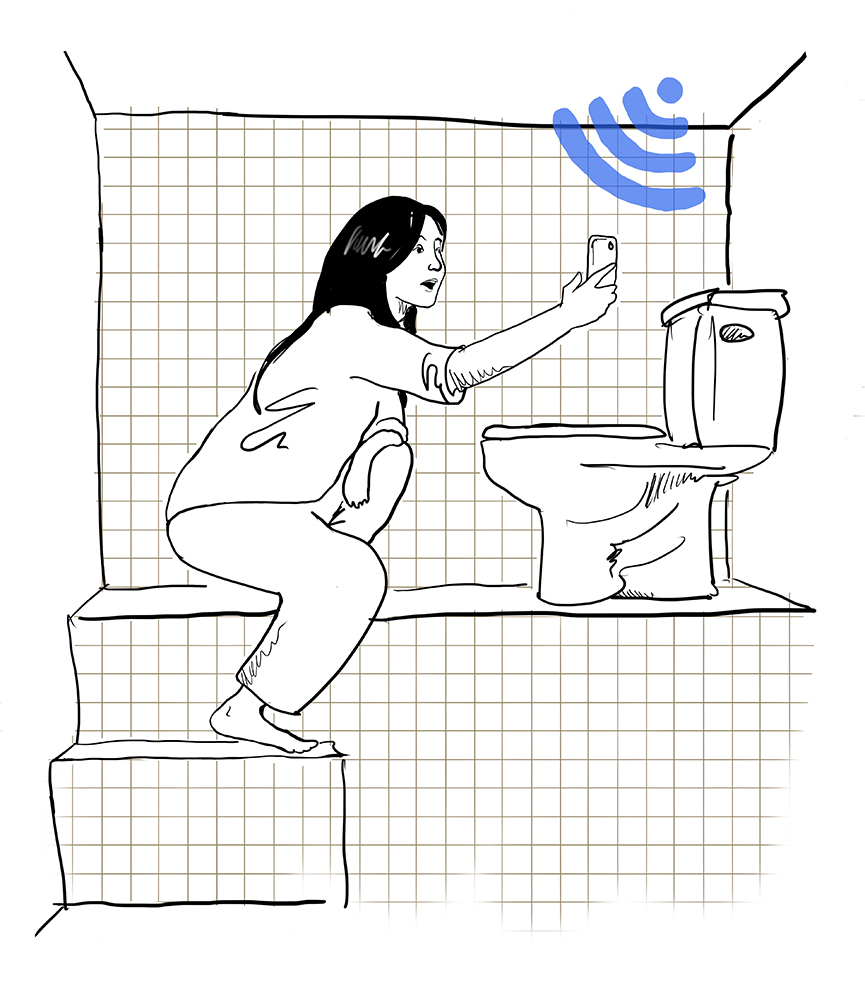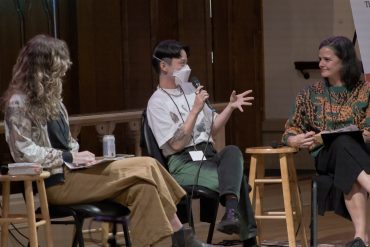Warning: spoilers for the entire series below.
“Picture a wave, in the ocean. You can see it, measure it—its height, the way the sunlight refracts when it passes through—and…it’s there. You can see it, you know what it is, it’s a wave. And then it crashes on the shore, and it’s gone. But the water is still there. The wave was just… a different way for the water to be, for a little while. That’s one conception of death for a Buddhist. The wave returns to the ocean, where it came from. And where it’s supposed to be.”
—Chidi Anagonye, The Good Place
I. What We Owe To Each Other
The significance of The Good Place doesn’t hit you until a while after you’ve finished it.
On the surface, it’s a heartwarming story about a group of four neurotic fork-ups who call themselves the Soul Squad, their demon buddy, and their omniscient not-a-girl friend. They work their way through four seasons of wacky hijinks in the afterlife. They fight demons and escape the Bad Place. They finally make it to the actual Good Place in the end. That’s the plot summary, at least. But The Good Place is much more than a simple IMDB page entry.
The Good Place is unique among modern TV shows in one respect: it presents a thesis, and a radical one at that. The show posits that everyone, no matter how bad they were during their life, is worthy of redemption. And through the twists and turns of four seasons, the show tries hard to get you to believe that too.
The afterlife presented by The Good Place is royally forked up when we first see it. Each person gets assigned to the Good Place or the Bad Place based on how many points they earned on Earth. Points are given and taken away based on the “absolute moral worth” of each action. Algorithms consider an action’s intent, its effect on others, and its residual consequences. When you die, your points get added together to decide where you get to go. If you manage to gain a massive number of points, congratulations! You make it to the Good Place! Everyone else? Womp womp. Down to the Bad Place for you. Look forward to penis-flattening for the rest of your eternal existence.
This system seems unfair from the start. In Season 3, we’re hit with another whammy: no one has made it into the Good Place for 527 years (since 1497 CE). The system judging each person’s moral score is incoherent and inconsistent anyway. Every branch of moral philosophy seems to be thrown in there. Each person is judged based on arbitrary ethical decisions (for example, planning a destination wedding is -1,200 points. The afterlife’s head accountant Neil watches as a computer tallies up point changes as the wedding’s details emerge, “oh, it’s a destination theme wedding -4,300 points,” Neil says. It gets worse when the wedding’s specific theme emerges, “The theme’s Lord of the Rings. They’re basically doomed.”). There seems to be no logical structure whatsoever.
The Good Place doesn’t shy away from social commentary. Its afterlife system seems to be a clear dig at Judeo-Christian ethics and Western ethical thought. Sure, the Good Place’s judgement system is idiotic and subjective—can you think of a real-world system that isn’t?
The main contention The Good Place makes is that everyone has the capacity to become better. Everyone is allowed to atone for their actions. One’s moral journey does not, and should not, end at their death. The Soul Squad comes up with a system to fix the afterlife that is radically egalitarian. It considers everyone as worthy of eternal paradise—they have to show they’ve learned their moral lessons, of course. The Good Place also gives each of its residents the assurance of time—time to spend with the people they love.
II. Help Is Other People
There are good people, and there are bad people. Right?
How do we decide who is good and who is bad? Can we even say someone can be good? What factors do we choose to look at? Their thoughts? Their actions? And then what? Do we consider the consequences of their actions, or the intention behind them? What about both, or neither? Are there strict moral rules, or can the ends sometimes justify the means?
These are all questions moral philosophers have dealt with for millennia, and we’re not about to answer them all here. The Good Place doesn’t really try to answer them either.
The original points system in The Good Place is simple. If the absolute moral worth of your action is positive, you gain points. Negative, you lose points. Simple, right? I mean, absolute moral worth can’t be that hard to calculate.
Moral philosophy has three main branches: deontology, consequentialism, and virtue ethics. Those all sound a lot more complicated than they are, so let’s break them down.
Deontology is the theory that there is a strict moral code everyone must follow. Being “moral” is then a matter of finding those rules and following them. Immanuel Kant is a towering figure in deontology. Kant believed there was one rule that defined all other rules, which he called the “categorical imperative.” He defined it like this: “Act only according to that maxim whereby you can at the same time will that it should become a universal law.” Wordy writing aside, all this means is that whatever you do, think of what would happen if everyone did it. To Kant, lying is wrong because if everyone lied all the time, lying would serve no purpose. It would be self-defeating, because truth wouldn’t matter anyway at that point. This is one conception of what it means to “do good.” The intent of the action is all that matters.
Consequentialism is a whole different ball game. To consequentialists, the consequences of the action determine its goodness or badness. Under this theory, you could justify lying if it had a good effect. For example, lying to the FBI might break a few laws; if you save an innocent person’s life while doing so, though, the action is justified, and thus good. One of the more extreme forms of consequentialism goes even further. Utilitarianism holds that all actions are good or bad depending on the happiness they cause. Utilitarians try to maximize happiness in every action they take. Many philosophers use this theory to justify things like vegetarianism and veganism, for instance. What is the weight of your pleasure from eating meat, versus the pain of the animal that was killed to get it?
Finally, virtue ethics are the most forgotten and most misunderstood branch of ethics. Virtue ethicists say that goodness comes from the character of the person doing the action. In other words, each person should live according to certain virtues like courage, truthfulness, modesty, et cetera. Then, anything a virtuous person does is by definition virtuous, i.e. good. There are some problems with this theory, as there are with the others. For example, who decides what the “virtues” are? How do we know that everything virtuous people do is good? Do they decide what is good or bad, or are there larger rules governing them?
These three theories form the base of contemporary ethical thought. Lucky for us, the Good Place uses all three of them. Its points system is incoherent and subjective because it can’t decide what rules it follows. Take one action: sexual harassment. Committing an act of sexual harassment in The Good Place universe gives you -731.26 points. (Note how you lose fewer points for harassment than you do for planning a destination wedding.) In contrast, bringing your own bags to the grocery store gains you 1,980.43 points. Bringing a reusable bag to Safeway excuses 2.708 instances of sexual harassment. This is ethics you can count on your fingers and toes.
The points system considers all ethical factors when judging an action—its consequences, the intent behind it, the character of the person doing it, et cetera. It also uses subjective metrics for many actions. For example, “buy[ing] a trashy magazine” is a net loss of -0.75 points. Why? Because Good Place architects don’t like the National Enquirer?
Beyond these issues, the Soul Squad discovers a much larger problem at the end of Season 3: The modern world is too complicated for anyone to be a good person. The interlocking effects of globalization and exploitation make it impossible to judge the impact of your actions. Buying a tomato from the store means your money supports exploitative farms, underpaying migrant laborers, and corrupt multinational corporations. This is before mentioning the carbon impact of factory farms. Season 3 comes within a hair’s breadth of saying “there is no ethical consumption under capitalism.” Buying a flower for your grandma 300 years ago might have netted you a good amount of points. Today? That same flower was farmed, picked, and shipped by a corporation who cares more about profits than people. Those residual effects get passed on to you as soon as you hand over the money to buy the flower.
The Good Place fixes this problem by declaring the whole thing moot. The idea that you could rate someone’s “goodness” with a point system at all is absurd. In the new system the Soul Squad dreams up, your points still matter, but not in the same way. They act as a “starting point” of how much you have left to improve after you die. If you get, say, 50 million points—up to the Good Place for you. But if you end up with -1,400, then you have some more work to do. You go through a series of tests that target your biggest insecurities, weaknesses, and bad behaviors. Once you pass the tests and show you’ve learned from your mistakes, you get to go to paradise with everyone else. That is a simplified description of it, sure, but you get the gist.
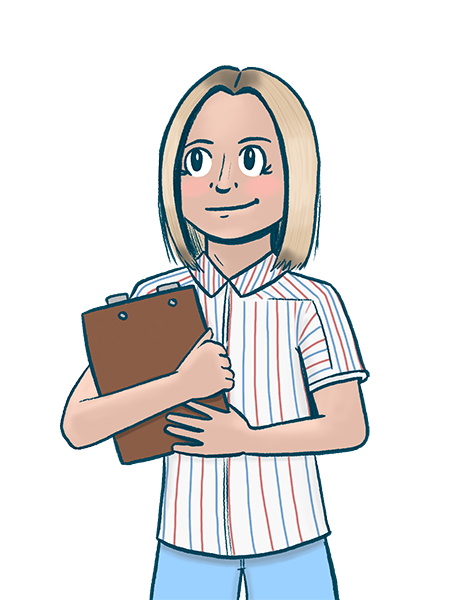
illustrations by Bailey Granquist
The Good Place argues that no one should be arbitrarily judged at a certain moment in their life (or death). Everyone has mitigating circumstances that prevent them from being their best self. Eleanor Shellstrop, one of the main characters of the show, sold fake diet pills to old people to make some quick cash. Should she be condemned to an eternity of punishment? She made a lot of mistakes and hurt a lot of people, but she was also never taught how to be good. She grew up in a broken family with a deadbeat dad and a vindictive mother. She dealt with her parents’ divorce, crushing loneliness, harmful friends, and bad role models. By the end of the series, she becomes one of the authors of the new afterlife system. Shouldn’t everyone get the same chance to become better?
The title of Season 4, Episode 7 is “Help Is Other People.” That could be the thesis of the whole show. It’s a spinoff of Jean-Paul Sartre’s phrase, “hell is other people,” and it encapsulates the spirit of the show. The Good Place states in no uncertain terms that everyone has the ability to become a better person, as long as they get the help they need to do so. Other people are key. Your moral “goodness” isn’t determined by some arbitrary point system. It’s determined by the quality of your relationships.
In the last line of his book What We Owe To Each Other, philosopher T.M. Scanlon writes, “Working out the terms of moral justification is an unending task.” Maybe we’ll never come up with a perfect system for determining the morality of our actions. The deontologists, consequentialists, virtue ethicists, and everyone in-between will argue forever. The Good Place doesn’t care very much about those squabbles. What really matters—the only thing that matters—is how you treat the people you love. After that, everything else has a way of falling into place.
III. Whenever You’re Ready
Philosopher Todd May acted as a philosophical advisor to the show (May cameos as himself in the series finale). Thus, looking at his work may be illuminating for our next subject: death. May writes in his book Death, “Death is not an accomplishment. It is not a goal. It is nothing more than a stoppage of our lives.” In May’s view, there is no “completion” to life in death. Death does not give meaning to life, and it does not bring it to a satisfying end. It cuts it short. It ends. If you happen to lack a belief in an afterlife, this might be a terrifying thought.
Many cultures and religions deal with this through a belief in an eternal afterlife. In the Judeo-Christian tradition, each person lives in either eternal paradise or damnation after death. We should examine this “spiritual immortality” the same way we would examine immortality on earth.
May devotes an entire third of his book to the issue of immortality, and whether it would be desirable. He uses the story “The Immortal,” by Jorge Luis Borges, as a parable for this type of “afterlife immortality.” In the story, the protagonist comes across a race of gnarled, hunchbacked creatures and a gigantic, winding maze. At the end of the maze lies the Fountain of Youth, making any who drink its water immortal. The story ends with the revelation that the troglodytes built the maze to prevent anyone else from reaching the Fountain. Immortality turned out to be a living hell for all who experienced it.
May does not paint immortality in a favorable light. If death has no inherent redeeming value, neither does eternal life. Living forever means experiencing all time. An immortal would do everything that there was to do, see everything that there was to see. They would run through all the novelty in the universe. Once they had exhausted all new experiences, they would still be trapped in that life. A life where everything, everywhere, for all time, would be boring. Over the course of infinity, the amount of time spent doing nothing would be infinite.
This is the situation our heroes stumble upon when they enter the real Good Place. Its residents are in paradise, yet nothing interests them anymore. Their brains have turned to mush. The Good Place architects have racked their brains trying to find anything to introduce some novelty into the experience. They jot down their ideas, including “music you can eat,” “get more chocolate in chocolate,” and “wait until Beyoncé gets here, ask her to fix it.” None of their ideas will ever work, though, because of one thing: immortality.
It is impossible to live a happy, immortal life. Think of Judeo-Christian Heaven. It acts as a kind of shorthand for “paradise” in our culture, but have any of us thought through its implications? Think of all the drawbacks of immortality listed above. These problems still exist. Even if we grant that Heaven could produce an infinite number of novel experiences, it doesn’t matter. We must accept what philosophers have accepted for centuries: An eternity of anything would be intolerable.
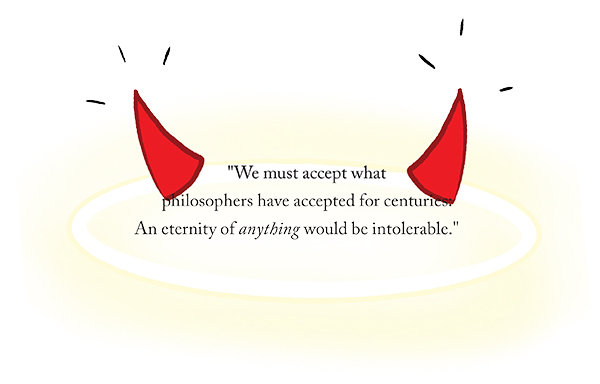
The Good Place takes a different approach to the afterlife. The Soul Squad comes up with a simple, elegant solution to the problem of immortality. They have to die. The group creates a door out in a forest, in the far reaches of the Good Place, where any resident can walk through—when they’re ready. When they do, the door redistributes their essence throughout the universe. Each person becomes a million little specks of positive energy, and their consciousness goes…well, somewhere.
In one fell swoop, the door solves all the problems of death and immortality that May envisioned. In The Good Place, death is not an abrupt end to life, nor does it leave any loose ends. You choose when you get to leave, whenever you’re ready. Death does give meaning to life. But death itself is only meaningful if you get to choose when you die. The Good Place gives each resident as much time as they would like to spend time with their loved ones; to learn any skills they wanted to learn on Earth; to go to any historical moment they would like; to any place in the universe; to experience anything they would like to experience; and then, when they’re ready, they get to leave.
This is the quiet compassion of The Good Place. It is not vengeful. It is not moralistic or self-righteous. It accepts each person for who they are, faults and all. Each broken person on this Earth can be forgiven. Everyone has the chance to spend a little more time with the people they love. And when they have made peace and said goodbye to everyone they care about, they walk through the door.
And the wave returns to the ocean.
IV. The Answer
Avram Hiller is an Associate Professor of Philosophy at Portland State. He specializes in analytic philosophy, including normative and environmental ethics. I sat down with Professor Hiller to talk about The Good Place, and the lessons it has for how we live our lives. That interview, edited for clarity and length, is below.
Gatlin: So, I just thought I would start with a broad question. What does being a good person mean to you?
Hiller: It’s a tough question to answer. I think there’s being a good person in terms of having a good spirit inside your mind. Then also living the life of a good person; and sometimes it’s very hard to have your life activities aligned with the person that you want to be. So I think to fully be a good person, it’s to really have the life that you live align with the good ideals that you hold. I mean, that’s something that Aristotle, way back when, realized, and I think to be a good person involves not just to have some commitments to good moral ideals, but to really reflect on them, because sometimes the right thing to do, the right commitments to have, might be very different from what society thinks they are. And so, it might take a long time to work through that. So that’s a very general answer to that question.
Do you think it’s possible to be a “good person?” Or do you think it’s possible to say that someone is good or bad?
Yeah, I do. I think, you know, when you say a “good person,” you can think about a scale of how good a person you are. And I think saying, “someone’s a good person,” is to set the bar at some level here.
I mean, maybe it’s not saying a person is a perfect person, but a good person. And so I do think it’s possible to be a good person. And I think I know some people who are good people. And then in terms of knowing whether somebody is a good person, Kant said, “Oh, it’s impossible to know if anybody ever at acts out of pure motive, as if they’re acting, you know, really for their own personal benefit or whether they’re acting out of the moral law.” And, you know, maybe he’s right that it’s impossible to fully know what’s going on inside people’s minds, but you can often get a pretty good sense of why people are doing what they’re doing. And a pretty good sense a lot of the time that people are doing things for good reasons.
What are your thoughts on moral dessert? Do you think that there is some pot at the end of the rainbow? Like, if you do enough good things, you get some reward, or…
If there is some reward, it would presumably be one’s own happiness; and not all good people end up being happy and some not-good people do end up happy. So, there’s certainly no guarantee. And sometimes they really come apart. Some good people end up being really miserable.
Aristotle thought that the very virtuous person ends up being happy, just as a mere side effect of being virtuous. And, as far as I know, I’m not sure how true that is. I think a lot of very good people just live somewhat unhappy lives. But some people, on the other hand, really have kind of their own judgments about what they should do. And they’re good judgments and they live them out and do them well and are very satisfied because of it. I do also think that one really good life project is to look out for other people and to try to help people. And so, that’s a good way to live a good and happy life. I think it’s definitely possible to gain happiness from being a good person, but it definitely doesn’t always happen.
Do you think it’s harder to be a good person today, or is it harder to act morally than it was 500 years ago?
That’s something I think a lot about. And it’s something we talked about the very first day of my environmental ethics class. I think in some ways it’s a lot harder, because we are so interconnected.
If you’re committed to not supporting child labor, but then you go to the store and you buy a shirt and it says, “made in Bangladesh.” Maybe you are, maybe you’re not, you don’t really know. And so many of our systems today are just designed to hide you from the effects of your actions.
I actually tend to think that there’s no “original sin”—that everybody’s kind of placed on earth about equally. Just as our potential negative effects are more significant because of globalization, our potential positive effects are also more significant because of globalization.
And so I actually, in the end, think that we’re about on equal footing to be a good person today as people at any other period of time. So I’m a bit more optimistic than some people.
If you give somebody who’s hungry a sandwich, I mean, who knows what will happen after that. But you do know that you’ve given somebody who’s hungry a sandwich. That’s the outcome that’s tangible to you, even if all the rest you don’t know. And so the expected goodness of that is positive.
I’m writing about how The Good Place treats the afterlife and death. What’s your perspective on immortality?
I tend to be the, I don’t know if you should call it the optimist side or the pessimist side, but I tend to be of the view that immortality would probably be a good thing.
If I had the choice, I would probably choose immortality. Although the option to die is probably even better just in case it gets boring after awhile. ‘Cause I think that the way we humans are, we’re a bit forgetful. And so our memories for what an experience is even like a month ago isn’t crystal clear. So you can have that experience again without it getting totally boring. So I actually think you can repeat experiences potentially infinitely and still have them be positive. That’s the basic reason why I think immortality probably wouldn’t be such a bad thing, because of this feature of us that, um, that we’re slightly forgetful and we can vary our experiences slightly.
Yeah, I would sign up for an infinite life if I could. And I wouldn’t expect to get bored, but, it’s based on certain psychological things and that’s important. But yeah, some people have argued that it’s impossible to both live a good, infinite life and have you be the same person you used to be. But I can imagine it. It seems like a lot of fun.
Do you think that death gives a meaning to life, or do you think that if you had the choice not to die, that would be better?
Yeah, a lot of philosophers do say that death gives meaning to life, but…there’s a line from Woody Allen who said, “I want to live forever, not just in critic’s minds, but in my apartment.” And I kind of like that “apartment immortality.” I do think that life would still be pretty meaningful without death. Because you could still engage in the same kinds of projects because there would still be suffering in the world that, you know, maybe you can try to remediate. There would still be happiness that you can strive for. It still seems like there’d be a lot in the world that it gives meaning to one’s life, you know, projects that are worth undertaking.
And my last serious question is, assuming we do die…
Yeah.
What do you think would be your ideal scenario after death?
Oh, when you say die, you mean death of the earthly body?
Yeah.
Yeah, that’s a good question. Mmm.
I guess I haven’t put too much thought into it just because I’m fairly realistic that after my body goes, so does the rest of my existence. Yeah, no, I think I probably want to sit down for a little while and think of a Good Place. Yeah, I’d probably want to sit down with some Good Place consultants, and I assume it would contain a lot of the good things that I already enjoy, that I know I enjoy. I’m sure there are a lot of experiences that I would enjoy if I only had done them, or if I knew what they were like, but I’ve never done them. So, I’d probably want to get other company’s advice on things. But it would include a lot of the things that we have here.
